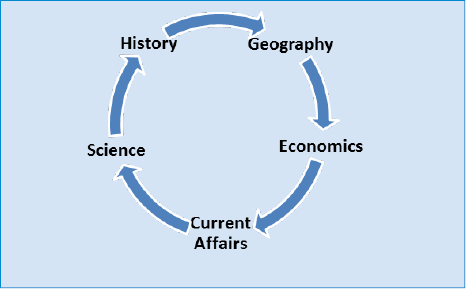The Union Public Service Commission’s Civil Services Examination or the commonly known ‘IAS Exam’ is triumphantly considered the toughest nut to crack. Most Indians would love to see their children climb this Everest, which literally, one in a million summits each year (pardon the exaggeration). The UPSC conducts various examinations round the year for several government post openings. The process, otherwise absolutely transparent, is largely mooted backbreaking and toilsome. The primary purpose of this article is to cleanse such misconceptions (which rose probably from the pre-colonial times) off the minds of wishful aspirants. Being in the list of top 1100 out of 4.65 Lac exam takers (2015 statistics) doesn’t sound too easy, does it?

Step A: Motive
The origin of the thought of taking the examination is the primary survival instinct in the race to the Civil services finalist list. What prompts one to take it? Encouraging parents/teachers, news of a neighbours’ kid cracking the IAS, social pressures or plain will to serve the country? Before entering the grind, one must comprehend this is not the only way to live a respectful, worthy and classy life. Only if serving the country through civil work is your charm and is the music you’d like to bask in a daily basis, then this sure is ‘the league’ you should contemplate entering.
The exam takes place on the third Sunday of August each year. Preparation for the Civil Services/UPSC exam is infamously known to be by far the most grueling experience. Only the sturdiest, pertinacious and sternly patient minds survive the journey. And the raw material for these qualities is genuine motive, which makes the entire course of preparation and attempt, an exciting journey, one that changes the aspirants for life, whether or not they clear this examination.
Half-hearted confused souls should seriously rethink their odds. Clearing the UPSC, starting from preparing say about ten months prior to the Prelim/CSAT exam, to the release of the final list (after the interview stage), can take about a year and a half (Only if you clear it in the first attempt). This timeline has no misinterpretations or alternatives. Evidently this is the minimum duration of time of your life which has to be devoted for this queen of queen’s examination. If you interpret, this is strength training, not weight training. In my opinion most aspirants have the required IQ for the examination. But, it’s the persistence coupled with that IQ which distinguishes the successful ones.
Step B: Process Initiation

Once the motive has been established, it’s time to initiate the life long process of learning. Mind you, learning only what is necessary. One doesn’t have to be a book maggot, absorbing everything and anything coming its way. In fact one has to be sure of knowing ‘what not to read’. The vast syllabi given on the official website (your new temple) is enough to recognise the magnitude and depth of knowledge one has to acquire, understand, interlink and propagate.
Syllabus of Paper-I of the Preliminary Examination can roughly be classified under the following heads: History, Geography, Science, Economics and Current Affairs. These heads cover the entirety of wavelength of the syllabus. Paper-II is a qualifying paper. I shall talk at length about these two papers in an upcoming article soon. Word to the wise; for starters, nothing beyond this is there for you to worry about.
Newspapers are your best friends, will always be.
If you’re not regular with newspapers (or don’t read them at all), here’s good news, you don’t have to be ashamed. Start from grabbing today’s paper and you shall be absolved of your sins. Remember, from now on newspapers are a daily routine. There certainly is no substitute to newspapers. Choose one or two papers of your choice (The Hindu being the favourite, but that’s not enough) and add them to your daily diet. Cram up the entire paper for maximum learning at first. It’s only with time that you’ll gain selective reading capabilities. I shall soon come up with an article on how to read a newspaper too.
Some Quick Tips
All sorts of aspirants clear the examination each year. Working or non working, final year or passed out, age complications, background diversities; there are no bounds at all.
Coaching is a good catalyst and good way to analyse your enemies, i.e. competition.
Mocks don’t require preparation, so start from day one.
Word to the wiser: Preparation isn’t about cramming up blindly whatever comes your way (in a little way it is though), it is more about interlinking all that data you have gathered. Unless it can be completed and correlated, one can’t even get near the gist of the questions.
ABOUT THE AUTHOR
Abhinav Sharma is an expert in Education Management and Career Consultancy. He currently manages corporate relations for Gautam Buddha University (Government of U.P.). He has over 9 years of experience in project management in various capacities, in government as well as corporate sectors. Abhinav is an Electronics and Telecommunications engineer (from JSSATE, Noida), and an MBA in Strategy and Marketing (from Great Lakes Institute of Management, Chennai). Outside work, Abhinav is a Singer (with 12 years of classical music training in Hindustani music), Drummer, Writer, Sketch Artist and a fitness enthusiast.





